指示代词反身代词
- 格式:ppt
- 大小:340.50 KB
- 文档页数:24
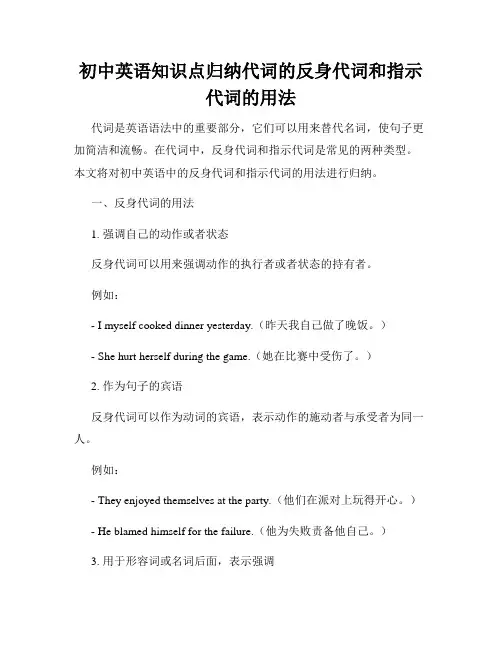
初中英语知识点归纳代词的反身代词和指示代词的用法代词是英语语法中的重要部分,它们可以用来替代名词,使句子更加简洁和流畅。
在代词中,反身代词和指示代词是常见的两种类型。
本文将对初中英语中的反身代词和指示代词的用法进行归纳。
一、反身代词的用法1. 强调自己的动作或者状态反身代词可以用来强调动作的执行者或者状态的持有者。
例如:- I myself cooked dinner yesterday.(昨天我自己做了晚饭。
)- She hurt herself during the game.(她在比赛中受伤了。
)2. 作为句子的宾语反身代词可以作为动词的宾语,表示动作的施动者与承受者为同一人。
例如:- They enjoyed themselves at the party.(他们在派对上玩得开心。
)- He blamed himself for the failure.(他为失败责备他自己。
)3. 用于形容词或名词后面,表示强调反身代词可以用于形容词或者名词后面,起强调作用。
例如:- The queen herself attended the event.(女王亲自参加了这个活动。
)- I myself am responsible for this project.(这个项目由我个人负责。
)二、指示代词的用法指示代词用来指示人或物,表明离说话者的距离或空间位置。
1. 指示远处的人或物例如:That is my pen.(那是我的钢笔。
)2. 指示近处的人或物例如:This is my book.(这是我的书。
)3. 指示两者中较远的人或物例如:Those are their bicycles.(那些是他们的自行车。
)4. 指示两者中较近的人或物例如:These are our chairs.(这些是我们的椅子。
)指示代词还可以作为主语、宾语或者定语使用,具体使用方式根据上下文的需要来决定。
三、反身代词和指示代词的辨析反身代词和指示代词虽然在形式上相似,但在用法上有所不同。
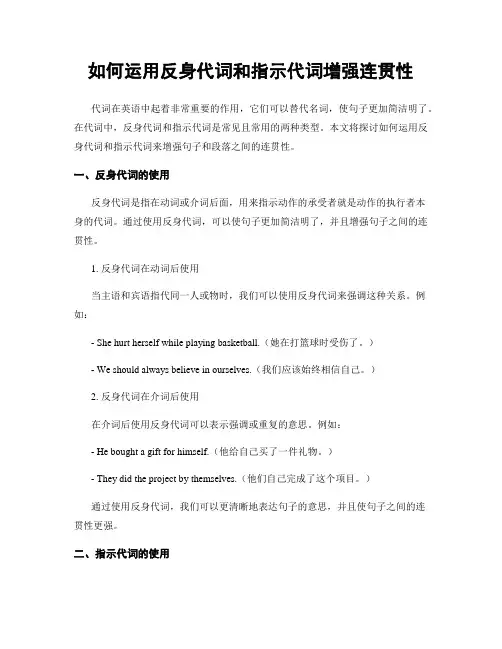
如何运用反身代词和指示代词增强连贯性代词在英语中起着非常重要的作用,它们可以替代名词,使句子更加简洁明了。
在代词中,反身代词和指示代词是常见且常用的两种类型。
本文将探讨如何运用反身代词和指示代词来增强句子和段落之间的连贯性。
一、反身代词的使用反身代词是指在动词或介词后面,用来指示动作的承受者就是动作的执行者本身的代词。
通过使用反身代词,可以使句子更加简洁明了,并且增强句子之间的连贯性。
1. 反身代词在动词后使用当主语和宾语指代同一人或物时,我们可以使用反身代词来强调这种关系。
例如:- She hurt herself while playing basketball.(她在打篮球时受伤了。
)- We should always believe in ourselves.(我们应该始终相信自己。
)2. 反身代词在介词后使用在介词后使用反身代词可以表示强调或重复的意思。
例如:- He bought a gift for himself.(他给自己买了一件礼物。
)- They did the project by themselves.(他们自己完成了这个项目。
)通过使用反身代词,我们可以更清晰地表达句子的意思,并且使句子之间的连贯性更强。
二、指示代词的使用指示代词用来指示特定的人或物,通过使用指示代词,可以使句子更加具体明了,并且增强句子之间的连贯性。
1. 指示代词作主语当我们需要强调特定的人或物是动作的执行者时,可以使用指示代词作为主语。
例如:- This is my book.(这是我的书。
)- That is your car.(那是你的车。
)2. 指示代词作宾语当我们需要强调特定的人或物是动作的承受者时,可以使用指示代词作为宾语。
例如:- I saw him yesterday. This made me very happy.(我昨天见到了他。
这让我很开心。
)- She gave me a present. That was very kind of her.(她给了我一个礼物。
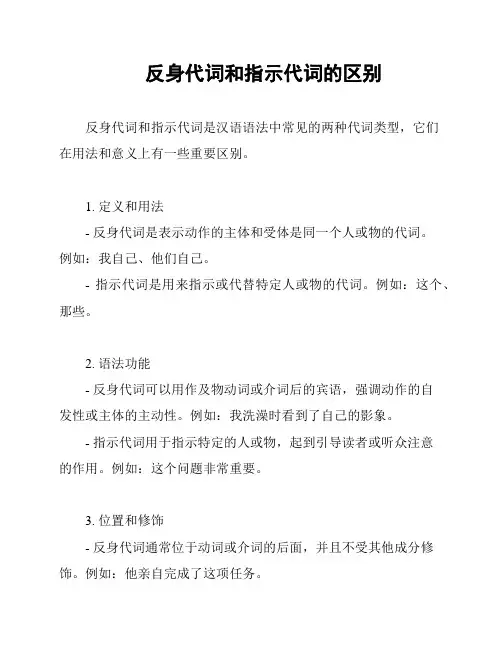
反身代词和指示代词的区别
反身代词和指示代词是汉语语法中常见的两种代词类型,它们
在用法和意义上有一些重要区别。
1. 定义和用法
- 反身代词是表示动作的主体和受体是同一个人或物的代词。
例如:我自己、他们自己。
- 指示代词是用来指示或代替特定人或物的代词。
例如:这个、那些。
2. 语法功能
- 反身代词可以用作及物动词或介词后的宾语,强调动作的自
发性或主体的主动性。
例如:我洗澡时看到了自己的影象。
- 指示代词用于指示特定的人或物,起到引导读者或听众注意
的作用。
例如:这个问题非常重要。
3. 位置和修饰
- 反身代词通常位于动词或介词的后面,并且不受其他成分修饰。
例如:他亲自完成了这项任务。
- 指示代词可以位于主语、宾语、定语、状语等位置,并且可以修饰其他成分。
例如:这个苹果很好吃。
4. 指示性质
- 反身代词是表示自己或某个群体成员之间的关系,具有反身性质。
- 指示代词是用来特定指代某个人或物,具有指示性质。
总结起来,反身代词强调主语与动作的关系,而指示代词主要用于指示和代替特定的人或物。
在句子中使用时,需要注意它们的不同用法和语法位置。
希望本文对你理解反身代词和指示代词的区别有所帮助。
![[荐]初中英语语法—人称代词、物主代词、反身代词、指示代词、疑问代词-全考点详解](https://uimg.taocdn.com/c671bde7bed5b9f3f80f1c57.webp)
初中英语语法—人称代词、物主代词、反身代词、指示代词、疑问代词-全考点详解一、人称代词1.人称代词指代人或物,分为主格和宾格。
主格在句中充当主语;宾格在句中充当动词的宾语或表语、介词的宾语。
2.人称代词的顺序当多个人称代词并用时,单数你他我,复数一二三,道歉我为先。
如:You, he and I are 18./ We, you and they are from China.3.it的用法(1)it除了用来代替上文所提到的事物外,还可用来表示时间、天气、距离、季节等。
如:-How's the weather today?-It's sunny.(2)可代替动词不定式作句中的形式主语或形式宾语。
It's + adj./n. (for sb./ of sb.) + to do sth. (it作形式主语);sb. find(s)/think(s) it + adj.+ to do sth. (it作形式宾语)。
如:It's necessary for us to learn English well.She found it difficult to learn geography.二、物主代词物主代词分为形容词性物主代词和名词性物主代词。
1.形容词性物主代词作定语修饰名词,不能单独使用。
如:This is her dictionary.2.名词性物主代词相当于"形容词性物主代词+名词",句中作主语、宾语、表语,可与of所有格连用。
如:This dictionary is hers./She is a friend of mine.三、反身代词反身代词表示"某人自己的"。
句中可用作动词或介词的宾语,也可用作主语或宾语的同位语,表示强调。
反身代词的构成规律是:第一、二人称的反身代词是形容词性物主代词+self/selves;第三人称的反身代词是人称代词宾格+self/selves。
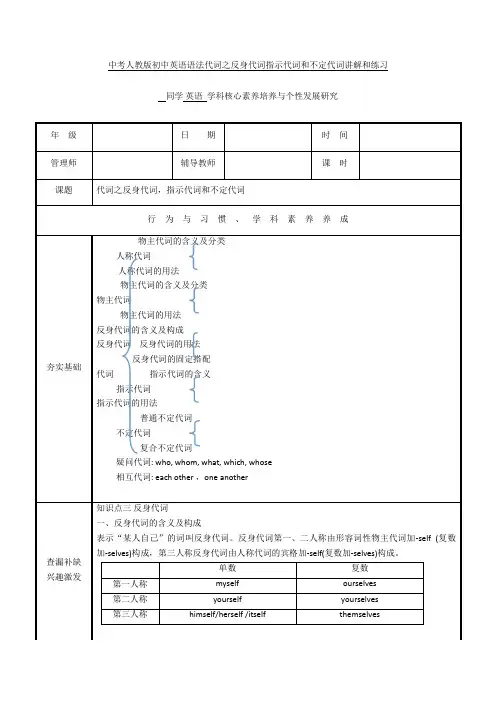
中考人教版初中英语语法代词之反身代词指示代词和不定代词讲解和练习同学英语学科核心素养培养与个性发展研究1.There are several pretty girls standing under the tree, but ______ are known to me.a. neitherb. nonec. no oned. all2.In one year rats eat 40 to 50 times ______ weight.a. itsb. andc. theird. theirs3.You’d better continue to use the same spelling of your name as ____ you used in your application.a. oneb. the onec. anyd. some one4.The little baby was left alone, with ______ to look after it.a. someoneb. anyonec. not oned. no one5.John can play chess better than ______ else.a. the oneb. no onec. any oned. another6.The weight of something is another way of describing the amount of force exerted on __ by gravity.a. itb. themc. thatd. one7.It is one thing to enjoy listening to good music, but it is quite ______ to perform skillfully yourself.a. otherb. anotherc. somed. any8.Children should be taught how to get along with ______.a. anotherb. otherc. othersd. any other9.The poor man lived on wild berries and roots because they had ______ to eat.a. nothing elseb. anything elsec. something otherd. nothing other10.I go to the cinema ______ day, Tuesdays, Thursdays, and Saturdays.a. each otherb. every otherc. this and the otherd. all other11.One of the properties of light is _____ traveling in wave form as it goes from one place to another.a. itb. it’sc. itsd. their12.______ in the world has been asked to do his duty for the human society.a. Each of the trampsb. Every of the trampsc. The each trampd. The every tramp13.In some restaurants, food and service are worse than ______ used to be.a. theyb. itc. themd. that14.Let the porter take all the baggage out and put ______ in the lobby.a. itb. theyc. themd. its15.Everyone who comes to the party is given a wooden apple with _____ own names cut in it as a souvenir.a. hisb. herc. theird. our16.Everybody in the class must give in ______ exercise book within the given time.a. theirb. ourc. hisd. her17.During the journey, the boys and girls entertained ______ with songs and games.a. themselvesb. theirselvesc. himselfd. itself18.You’d better buy ______ some fruits when you go on a trip.a. youselfb. myselfc. yourselfd. you19.The boys in this town like to bully ______.a. one anotherb. one and otherc. each otherd. one and the other20.One common family name is Black,______ is Anderson.a. anotherb. the otherc. othersd. none other21.I have two novels: one of the two is “Gone with the Wind’, and ______ is “the Tale of Two Cities’.a. anotherb. otherc. none otherd. the other22.All girls wear beautiful clothes. Some are dressed in red;______ in green.a. otherb. anotherc. othersd. none other23.She can’t seem to help herself. And ______ c an help her, either.a. none elseb. no one elsec. not anyd. somebody else24.Children can usually dress ______ by the age of five.a. himb. themc. hiselfd. themselves25.The gold watch had belonged to me for years, but the police refused to believe it was ______.a. meb. myc. mined. I’s26.Mother would not let Mary and ______ attend the hockey game.a. Ib. myc. med. we27.In a news conference this afternoon, the university announced that ______ intends to make sev eral important changes in next year’s budget.a. heb. itc. shed. they28.______ but a fool can make such a mistake.a. Everyoneb. No otherc. Not alld. None29.The poem by Browning is so observed that I cannot grasp ______ meaning.a. itsb. it’sc. theird. that30.The mayor felt that the police, in spite of the reports, had done ______ best.a. itsb. theirc. hisd. our31.I haven’t read ______ of the last four chapters, so I know little about them.a. anythingb. anyc. somed. something32.A pretty face may win friends but it takes character and personality to hold ______.a. itb. themc. thatd. one33.In the discussion, one speaker held that, since we live in a money-oriented society, the average individual cares little about solving ______.a. anyone else’s problemsb. anyone’s else problemsc. anyone else problemsd. problems of anyone else34.I don’t know whether small oranges are sweeter than big ______.a. thoseb. onesc. oned. that35.‘How much water is left in the bottle?’ ‘______’a. Nothingb. Nonec. Not somed. Not one36.It took two of them to do the work that ______ of us could do.a. someoneb. anyonec. any oned. everyone37.He has five children, and ______ of them is good at painting.a. everyoneb. everybody d. every one d. every38.I have three brothers,______ are in Beijing.a. no one of themb. neither of themc. some of themd. none of them39.Some of my students study a lot,______ just don’t care.a. anothersb. the otherc. some otherd. others40.As a matter of fact, Saudi Arabia’s oil reserves are second only to ______.a. Kuweitb. that of Kuweitc. Kuweits’sd. those of Kuweit41.This book of _______ used to be one of the best sellers in the shop.a. hisb. himc. that mand. this42.We should always keep ______ well-informed of the changing information.a. usb. oursc. ourselvesd. we二、英语书面表达专项训练2.假如你是李华,你的英国笔友 Jack 给你写邮件表达了想参加你校暑期为外国学生举办的汉语夏令营的愿望,希望你告知活动举办的具体时间地点,活动安排以及你的建议。
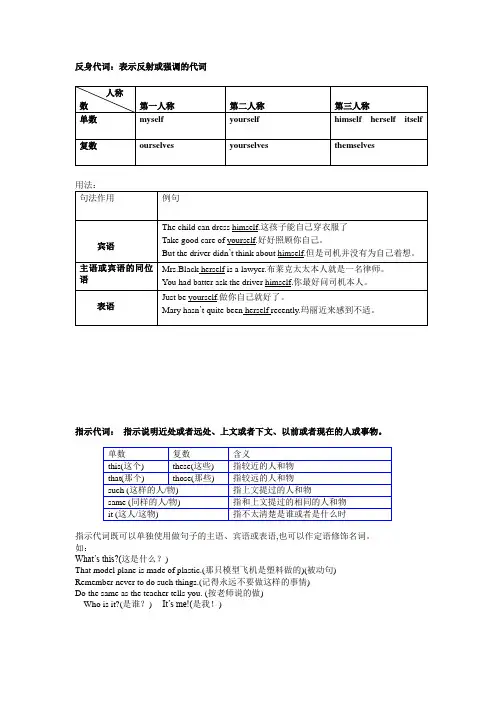
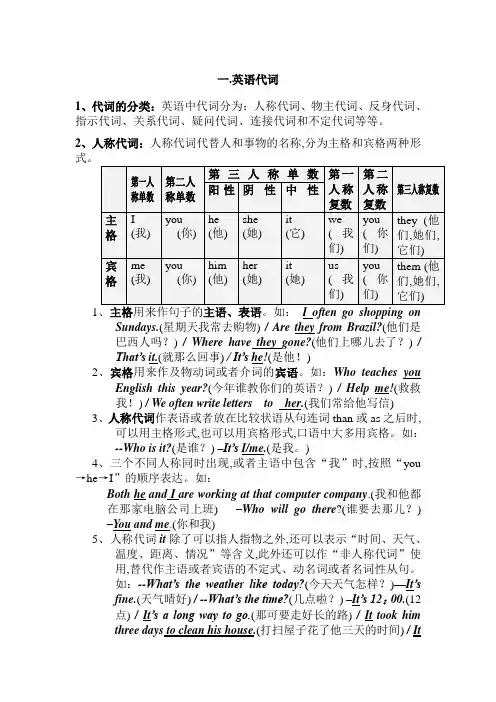
一.英语代词1、代词的分类:英语中代词分为:人称代词、物主代词、反身代词、指示代词、关系代词、疑问代词、连接代词和不定代词等等。
2、人称代词:人称代词代替人和事物的名称,分为主格和宾格两种形1I oftenSundays.(星期天我常去购物)/ Are they from Brazil?(他们是巴西人吗?)/ Where have they gone?(他们上哪儿去了?)/That’s it.(就那么回事)/ It’s he!(是他!)2、宾格用来作及物动词或者介词的宾语。
如:Who teaches youEnglish this year?(今年谁教你们的英语?)/ Help me!(救救我!) / We often write letters to her.(我们常给他写信)3、人称代词作表语或者放在比较状语从句连词than或as之后时,可以用主格形式,也可以用宾格形式,口语中大多用宾格。
如:--Who is it?(是谁?)–It’s I/me.(是我。
)4、三个不同人称同时出现,或者主语中包含“我”时,按照“you →he→I”的顺序表达。
如:Both he and I are working at that computer company.(我和他都在那家电脑公司上班) –Who will go there?(谁要去那儿?)–You and me.(你和我)5、人称代词it除了可以指人指物之外,还可以表示“时间、天气、温度、距离、情况”等含义,此外还可以作“非人称代词”使用,替代作主语或者宾语的不定式、动名词或者名词性从句。
如:--What’s the weather like today?(今天天气怎样?)—It’sfine.(天气晴好) / --What’s the time?(几点啦?)–It’s 12:00.(12点)/ It’s a long way to go.(那可要走好长的路)/ It took himthree days to clean his house.(打扫屋子花了他三天的时间) / Itis very clear that the public want to know when these men cango into space.(很显然,公众想知道这些人什么时候能进入太空)/ We found it very difficult to learn a foreign language well.(我们发觉要学好一门外语是非常困难的)3词。
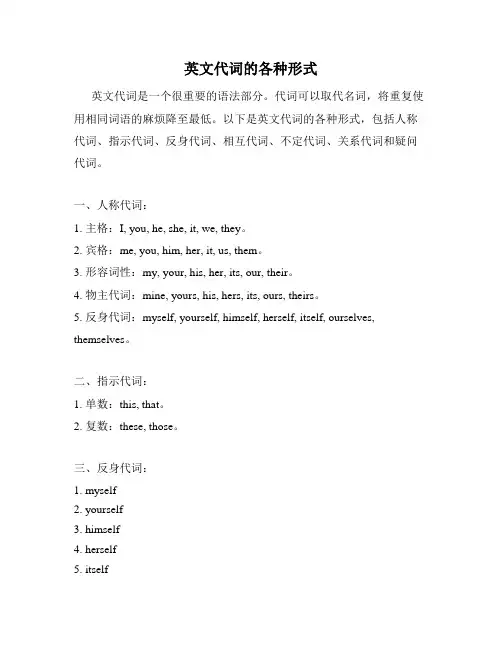
英文代词的各种形式英文代词是一个很重要的语法部分。
代词可以取代名词,将重复使用相同词语的麻烦降至最低。
以下是英文代词的各种形式,包括人称代词、指示代词、反身代词、相互代词、不定代词、关系代词和疑问代词。
一、人称代词:1. 主格:I, you, he, she, it, we, they。
2. 宾格:me, you, him, her, it, us, them。
3. 形容词性:my, your, his, her, its, our, their。
4. 物主代词:mine, yours, his, hers, its, ours, theirs。
5. 反身代词:myself, yourself, himself, herself, itself, ourselves, themselves。
二、指示代词:1. 单数:this, that。
2. 复数:these, those。
三、反身代词:1. myself2. yourself3. himself4. herself5. itself6. ourselves7. yourselves8. themselves四、相互代词:1. each other2. one another五、不定代词:1. some2. any3. no4. anybody/anyone5. somebody/someone6. nobody/no one7. everybody/everyone六、关系代词:1. that2. which3. who4. whom5. whose七、疑问代词:1. what2. who3. whom4. which5. whose以上是英文代词的各种形式。
对于想要成功学习英文的人来说,掌握这些代词是必不可少的。
对于英文写作、口语和听力理解来说,代词是非常重要的。

代词英语知识点整理
代词是英语语法中一个重要的部分,主要包括人称代词、物主代词、指示代词、反身代词、疑问代词、关系代词和不定代词等。
下面是这些代词的主要知识点:
人称代词:这是代词中最常见的一类,包括I(我)、you(你)、he(他)、she(她)、it(它)以及we(我们)、you(你们)和they(他们)。
人称代词的主格可以在句子中作为主语,而宾格则常用于动词或介词之后。
物主代词:表示所有关系,包括my(我的)、your(你的)、his(他的)、her(她的)、its(它的)、our(我们的)、your (你们的)以及their(他们的)。
这类代词的作用是在句子中表示某物属于谁。
指示代词:包括this(这个)、that(那个)、these(这些)和those(那些)。
它们通常用于指向或描述特定的对象或概念。
反身代词:表示动作的主体,如myself(我自己)、yourself (你自己)、himself、herself、itself等。
它们主要用于强调动作的自我性。
疑问代词:在提问中使用的代词,如who(谁)、what(什么)、which(哪个)等。
它们用于引导问题,询问特定的信息。
关系代词:用于连接主句和从句的代词,如who、whom、whose、
that、which等。
它们在定语从句中起到关键的作用。
不定代词:这类代词的词义不具体,常常用来表示一种或多种不确定的元素,如some(一些)、any(任何)、many(许多)、all(全部)等。
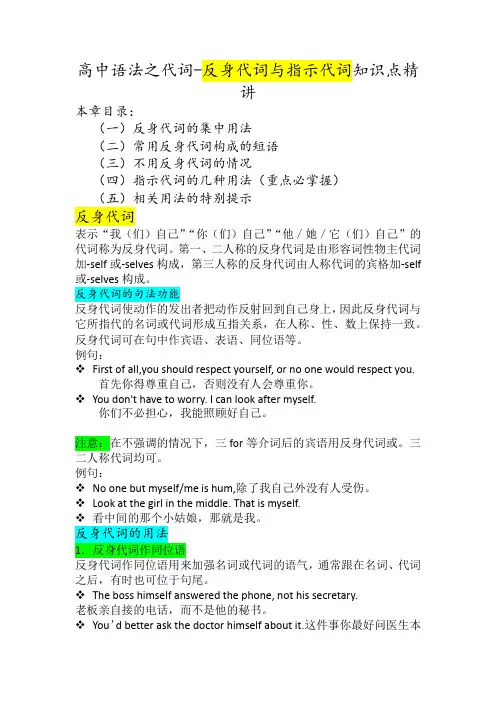
高中语法之代词-反身代词与指示代词知识点精讲本章目录:(一)反身代词的集中用法(二)常用反身代词构成的短语(三)不用反身代词的情况(四)指示代词的几种用法(重点必掌握)(五)相关用法的特别提示反身代词表示“我(们)自己”“你(们)自己”“他/她/它(们)自己”的代词称为反身代词。
第一、二人称的反身代词是由形容词性物主代词加-self或-selves构成,第三人称的反身代词由人称代词的宾格加-self 或-selves构成。
反身代词的句法功能反身代词使动作的发出者把动作反射回到自己身上,因此反身代词与它所指代的名词或代词形成互指关系,在人称、性、数上保持一致。
反身代词可在句中作宾语、表语、同位语等。
例句:❖First of all,you should respect yourself, or no one would respect you.首先你得尊重自己,否则没有人会尊重你。
❖You don't have to worry. I can look after myself.你们不必担心,我能照顾好自己。
注意:在不强调的情况下,三for等介词后的宾语用反身代词或。
三二人称代词均可。
例句:❖No one but myself/me is hum,除了我自己外没有人受伤。
❖Look at the girl in the middle. That is myself.❖看中间的那个小姑娘,那就是我。
反身代词的用法1.反身代词作同位语反身代词作同位语用来加强名词或代词的语气,通常跟在名词、代词之后,有时也可位于句尾。
❖The boss himself answered the phone, not his secretary.老板亲自接的电话,而不是他的秘书。
❖You'd better ask the doctor himself about it.这件事你最好问医生本人。
❖I cooked it myself.(=I myself cooked it.)我自己做的饭。
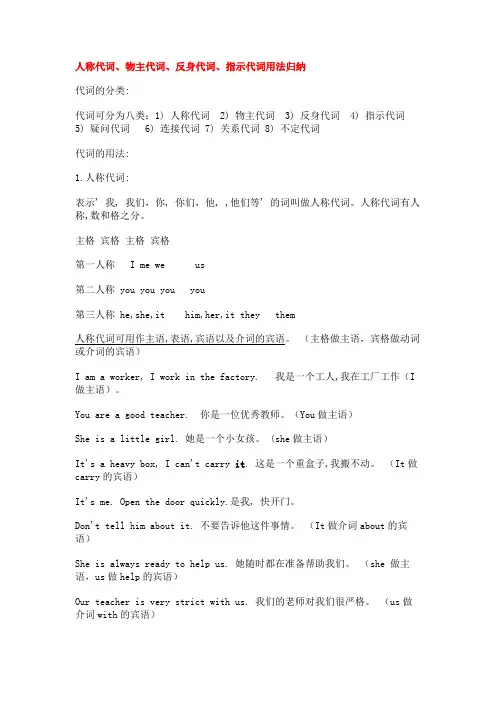
人称代词、物主代词、反身代词、指示代词用法归纳代词的分类:代词可分为八类:1) 人称代词2) 物主代词3) 反身代词4) 指示代词5) 疑问代词6) 连接代词 7) 关系代词 8) 不定代词代词的用法:1.人称代词:表示' 我, 我们,你, 你们,他, ,他们等' 的词叫做人称代词。
人称代词有人称,数和格之分。
主格宾格主格宾格第一人称I me we us第二人称 you you you you第三人称 he,she,it him,her,it they them人称代词可用作主语,表语,宾语以及介词的宾语。
(主格做主语,宾格做动词或介词的宾语)I am a worker, I work in the factory. 我是一个工人,我在工厂工作(I 做主语)。
You are a good teacher. 你是一位优秀教师。
(You做主语)She is a little girl. 她是一个小女孩。
(she做主语)It's a heavy box, I can't carry it. 这是一个重盒子,我搬不动。
(It做carry的宾语)It's me. Open the door quickly.是我, 快开门。
Don't tell him about it. 不要告诉他这件事情。
(It做介词about的宾语)She is always ready to help us. 她随时都在准备帮助我们。
(she 做主语,us做help的宾语)Our teacher is very strict with us. 我们的老师对我们很严格。
(us做介词with的宾语)人称代词中几个注意的情况:(1)第一人称单数代词 ' I (我)' 不论在什么地方都要大写。
I study English every day. 我天天学习英语。
(2)' we ' 常常代替' I '表示一种同读者,听众或观众之间的亲密关系。
一、代词的分类英语中常把代词分为人称代词、物主代词、反身代词、指示代词、疑问代词、连接代词、不定代词和相互代词。
二、代词的用法1.人称代词:人称代词是指人或事物的代词,有性、数、格的区别。
表示“我”“你”“他”“我们”“你们”“他们”。
请看下表:我的你的他的她的它的我们的你们的他/她/它们的形容词性物主代词 my your his her its our your their 名词性物主代词 mine yours his hers its ours yours theirs (1)形容词性物主代词在句中具有形容词的特征。
在句中作定语,后面跟名词。
例如: To our surprise, he has passed the exam.(2) 名词性的物主代词具有名词的特征,在句中作主语、表语、 May I use your bike? Mine is at school作主语) Whose glasses are these? They are hers. ( 作表语)My dictionary is lost. Can I use yours? (作宾语)(3) 名词性物主代词可以与of 连用,作定语。
例如:A friend of ours are waiting for us. 3.反身带词:用来表示“某人自己”的代词称为反身代词。
如下表所示:我(们)自己你(们)自己他/ 她/ 它自己 / 他们自己单数 myself yourself himself herself itself复数 ourselves yourselves themselves(1)反身代词在句中常用宾语,主语或宾语的同位语。
例如: Her sister is too young to dress herself. (作宾语)He himself is always making such mistakes. (主语同位语) You’d better ask your wife herself. (宾语同位语) (2) 反身代词可与其他词构成固定搭配,例如:make oneself at home, teach oneself, learn by oneself, help oneself to, enjoy oneself, come to ones elf, hurt oneself…,etc4.指示代词:表示时间和空间远近关系的代词叫指示代词。
代词一、代词的分类英语中常把代词分为人称代词、无主代词、反身代词、指示代词、疑问代词、连接代词、不定代词和相互代词。
二、代词的用法1.人称代词:人称代词是指人的代词,有性、数、格的区别。
表示"我" "你" "他" "我们" "你们" "他们"。
请看下表:(1) 人称代词主格在句中作主语。
例如:She is my English teacher.(2) 宾格在句中作宾语。
例如:They don't want me to go there alone.Don't worry. I can look after her.(3) 宾格还可以作宾格。
特别是在口语中。
例如:--- Who's that? --- It's me.注意:①人称代词we, you, they 可以用来表示一般人。
例如:You cannot go into the hall with slippers. 不准穿拖鞋进入大厅。
②人称代的主格作表语,一般都在正中的谈话中,表示强调。
例如:It was he who took away the necklace. 是他拿走了那条项链。
③人称代词she可以用指代祖国、大地、月亮、轮船等。
例如:The ship is leaving. She's on her first trip to Boston. 轮船要起航了。
这时她第一次去波士顿。
We love our country, we hope she'll be stronger and stronger. 我们热爱我们的祖国,我们希望她越来越强大。
④It作为人称代词时,可以表示天气、距离、时间、环境等。
例如:It is about 10 kilometres from here. 离这儿大约有10公里。
代词是代替名词的词类.大多数代词具有名词和形容词的功能。
英语中的代词,按其意义、特征及在句中的作用分为:人称代词、物主代词、指示代词、反身代词、疑问代词、不定代词。
一.人称代词:代替具体人名的词叫人称代词。
它有一、二、三人称与单数、复数及性别之分,还有主格与宾格之分。
人称代词有人称、数和格的变化:(1)Who’s Kate? 凯特是谁?She’s my friend。
她是我的朋友。
注:she代替上文中的Kate,而不能再用Kate来重复回答:Kate is my friend.(2)Li Lei is a boy. He's twelve。
李雷是个男孩,他十二岁。
注:he代替前句中的李雷。
(3)Look at that bird. It is Polly. 看那只鸟,它是波利。
注:it代替前句中的that bird。
(4)Who’s it?(门外有敲门声)谁呀? It's me。
是我.人称代词的用法★1)人称代词的主格在句子中作主语。
例如:He is student. 他是一个学生。
★2)人称代词的宾格在句子中作宾语或介词宾语,但在口语中也能作主语补语.)例如:I saw her with them at least,I thought it was her。
我看到她和他们在一起,至少我认为是她。
(her做宾语,them做介词宾语,her做主语补语)—— Who broke the vase?—-谁打碎了花瓶?—— Me. -—我.(me做主语补语= It's me。
)难点:主格和宾格的区别用法主格做句子主语,而宾格作为动词或者介词的宾语.(动宾结构或者介宾结构)例如:Give it to me。
(宾格)I love you. (主格)3). 并列人称代词的排列顺序①单数人称代词并列作主语时,其顺序为:第二人称-> 第三人称-> 第一人称,即you-> he/she; it -> I。
英语代词分类一.英语代词1、代词的分类:英语中代词分为:人称代词、物主代词、反身代词、指示代词、关系代词、疑问代词、连接代词和不定代词等等。
2、人称代词:人称代词代替人和事物的名称,分为主格和宾格两种形1Sundays.(星期天我常去购物) / Are from Brazil?(他们是巴西人吗?) / Where gone?(他们上哪儿去了?) / That’s 就那么回事) / It’s (是他!)2、宾格用来作及物动词或者介词的宾语。
如:Who teaches English this year?(今年谁教你们的英语?) / Help (救救我!) / We often write letters to (我们常给他写信)3、人称代词作表语或者放在比较状语从句连词than或as 之后时,可以用主格形式,也可以用宾格形式,口语中大多用宾格。
如:--Who is it?(是谁?) CIt’s (是我。
)4、三个不同人称同时出现,或者主语中包含“我”时,按照“you→he→I”的顺序表达。
如:.(我和他都在那家电脑公司上班) CWho will go there?(谁要去那儿?) C.(你和我)5、人称代词it除了可以指人指物之外,还可以表示“时间、天气、温度、距离、情况”等含义,此外还可以作“非人称代词”使用,替代作主语或者宾语的不定式、动名词或者名词性从句。
如:--What’s the weather like today?(今天天气怎样?)―It’s fine.(天气晴好) / --What’s the time?(几点啦?) C:00.(12点) / It’s a long way to go.(那可要走好长的路) / It took him (打扫屋子花了他三天的时间)(很显然,公众想知道这些人什么时候能进入太空) .(我们发觉要学好一门外语是非常困难的)3词。
如:(那是你的伞吗?)aunt on Sundays.(我经常在星期天去看望阿姨)books.(是他们的书)2、名词性物主代词相当于名词,既代替事物又表明所属关系,在句子中往往独立地作主语、宾语或者表语,后面千万不可以跟名词。
反身代词反身代词又称为自身代词,表示动作行为反射到行为执行者本身。
它还可以在句中起到强调的作用,用以加强语气。
英语中共有八个反身代词,在使用时应注意和它所指的相应的对象在人称、性别、数上保持一致。
其基本形式如下表所示:数人称第一人称第二人称第三人称单数myself yourself himself herself itself复数ourselves yourselves themselves用法:1 可用作宾语,指的是宾语和主语表示同一个或同一些的人或事物。
如:Maria bought herself a scarf. 玛丽亚给自己买了一条围巾。
We must look after ourselves very well. 我们必须好好照顾自己。
2 可用作表语,指的是表语和主语表示同一个或同一些人或事物。
如:She isn’t quite herself today. 她今天有点不舒服。
3 可用作主语或宾语的同位语,常用来加强语气。
如:She herself will fly to London tomorrow. 明天她自己将要坐飞机去伦敦。
I met the writer himself last week. 我上周见到了那位作家本人。
4 用在某些固定短语当中。
look after oneself / take care of oneself 照顾自己teach oneself sth./ learn sth. by oneself自学enjoy oneself玩得高兴,过得愉快help oneself to sth请自用……(随便吃/喝些……).hurt oneself摔伤自己 say to oneself自言自语lose oneself in 沉浸于,陶醉于……之中leave sb. by oneself把某人单独留下buy oneself sth.给自己买……东西introduce oneself 介绍……自己“介词+反身代词”的固定词组有:①by oneself (=alone):独自地;单独地She lives by herself. 她一个人住着。
人称代词、物主代词、反身代词、指示代词用法归纳及练习人称代词、物主代词、反身代词、指示代词用法归纳代词的分类:代词可分为八类:1) 人称代词2) 物主代词3) 反身代词4) 指示代词5) 疑问代词6) 连接代词 7) 关系代词 8) 不定代词代词的用法:1.人称代词:表示' 我, 我们,你, 你们,他, ,他们等' 的词叫做人称代词。
人称代词有人称,数和格之分。
主格宾格主格宾格第一人称I me we us第二人称 you you you you第三人称 he,she,it him,her,it they them人称代词可用作主语,表语,宾语以及介词的宾语。
(主格做主语,宾格做动词或介词的宾语)I am a worker, I work in the factory. 我是一个工人,我在工厂工作(I做主语)。
You are a good teacher. 你是一位优秀教师。
(You做主语)She is a little girl. 她是一个小女孩。
(she做主语)It's a heavy box, I can't carry it. 这是一个重盒子,我搬不动。
(It 做carry的宾语)It's me. Open the door quickly.是我, 快开门。
Don't tell him about it. 不要告诉他这件事情。
(It做介词about 的宾语)She is always ready to help us. 她随时都在准备帮助我们。
(she 做主语,us做help的宾语)Our teacher is very strict with us. 我们的老师对我们很严格。
(us做介词with的宾语)人称代词中几个注意的情况:(1)第一人称单数代词 ' I (我)' 不论在什么地方都要大写。
I study English every day. 我天天学习英语。